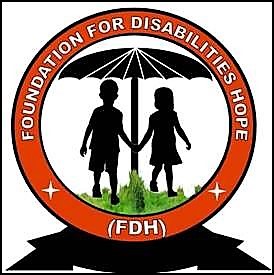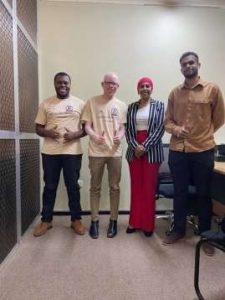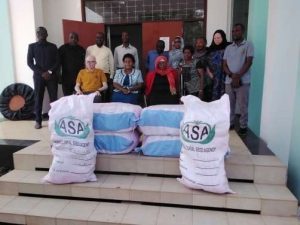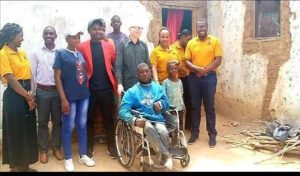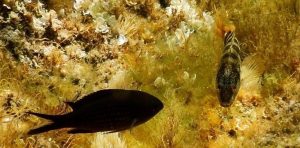…While western countries are discussing Covid vaccines booster options and are about to throw out about 50 million excess doses by the end of the year (according to Airfinity) the vast majority of countries in the world are far below the minimum coverage level even for vulnerable groups (elderly and people with comorbidity) and health professionals…
…While scientists are trying to understand the impact of SARS-Cov-2 Omicron variant, the pharmaceutical industry already announced that new versions of the vaccine to fully protect against Omicron will be available by March 2022. Do we really need a new vaccine for this new variant? We don’t know, but we know that the pharma industry is again surfing the wave and ready to make money, and the western governments will eventually pay, even before knowing what data says…

By Stella Egidi
Medical Referent Médecins Sans Frontières Italy
Covid-19, the Omicron Variant and the “Butterfly Effect”
The appearance of the Omicron variant has suddenly brought back to global attention the fact that the pandemic is far from being under control and that at every turn of the corner a new unforeseen event might hamper every earlier success.
It has also shown once more the short-sightedness of national strategies that most of countries, primarily western ones, have applied in the face of this pandemic. Since its arrival over a year and a half ago, many first reacted by closing borders and entrenching themselves in their useless national boundaries, despite that evidence shows how ineffective this measure is, bringing instead harmful consequences. In fact, the only result was increasing discrimination and penalizing countries already largely disadvantaged by this epidemic.
The World Health Organization said the highly mutated Omicron variant of Covid-19 could change the course of the pandemic[i]. The main concern is related to its high transmissibility, currently leading to a new Covid-19 wave in Southern Africa, that could allow this variant to quickly replace Delta worldwide (the variant is expected to be dominant in Europe by February-March[ii]).
What to expect exactly is “still difficult to know” according to WHO Director General Tedros Adhanom Ghebreyesus. “Certain features of Omicron, including its global spread and large number of mutations, suggest it could have a major impact on the course of the pandemic”. The reality, however, is that very little is known so far about the potential impact of the new variant, especially its severity. Paradoxically, if a lower severity of clinical manifestations than Delta is confirmed, considering the high transmission rate and the fast spread amongst susceptible people, the Omicron variant could even become an advantage. Scientists around the world are currently struggling to get data and understand how contagious and lethal this new variant will be on a large scale.
What we know for sure is the detrimental impact produced by travel bans immediately put in place by many countries. An increasing number of countries are closing borders, prohibiting the arrival of international travelers from Southern African countries where the new variant is being detected. Countries affected by the restrictions are already experiencing heavy economic, commercial and political consequences of this decision, which was not based on any scientific evidence. Ironically, instead of being rewarded for their prompt and efficient surveillance system that allowed other countries to prepare themselves and the scientific community to explore and study the new variant early on in order to find solutions, these countries are being “punished” as the so-called “plague spreaders”.
The WHO had already clearly advised many months ago against travel bans and advocated for countries to continue applying an evidence-informed and risk-based approach when implementing travel measures.
Even in cases when such measures could be effective in mitigating the spread to some degree, they are largely taken when it’s too late. With the Omicron variant it has been demonstrated that the new strain was already circulating in Europe at the time it was detected and announced by South African authorities (whose public health surveillance system was simply the most efficient at detecting it!). So far, according to available data, the Omicron variant has been confirmed in 57 countries[iii].
As WHO has stated, “Blanket travel bans will not prevent the international spread, and they place a heavy burden on lives and livelihoods. In addition, they can adversely impact global health efforts during a pandemic by disincentivizing countries to report and share epidemiological and sequencing data. Alternative measures, like screening of passengers prior to travelling and/or upon arrival, including via the use of SARS-CoV-2 testing or the application of quarantine to international travelers defined following a thorough risk assessment process informed by the local epidemiology in departure and destination countries, and commensurate with the risk, time-limited and applied with respect to travelers’ dignity, human rights and fundamental freedoms might be applied to mitigate the potential impact of variant spreading and to fight the epidemic in a more rational way”[iv].
Very little is known about the impact of the new variant on vaccines. A first small study[v] showed a decrease in antibody protection against the new variant, but we know how to identify antibody level with the broader immune protection, given the complexity of this last, can be misleading. While scientists are trying to understand the impact, the pharmaceutical industry already announced that new versions of the vaccine[vi] to fully protect against Omicron will be available by March 2022. Do we really need a new vaccine for this new variant? We don’t know, but we know that the pharma industry is again surfing the wave and ready to make money, and the western governments will eventually pay, even before knowing what data says.
The Omicron variant has also again brought to light the high inequality that has affected middle and low income countries throughout the epidemic more than ever before. Excellent documentation[vii] has spelled out how heavy and long-lasting the impact of the pandemic has been on the poorest countries, and that they not only have been affected by the virus far more than available data shows (we know how weak are surveillance systems in poorest countries) but are paying the heaviest burden in terms of economic impact and ability to recover.
Those who lost income due to the pandemic have been almost twice as likely to spend their assets or savings, leaving them less able to cope with continued or recurrent income losses.
In turn this will likely lead to progressive increase in impoverishing poor; lead to job losses, hamper productivity, stop income growth, increase soil exploitation, and result in deepening economic dependance of the poorest countries on external aid and push more population towards global migration.
How to reverse this vicious circle? To simplify a complex topic, we could say: by giving Covid-19 vaccines to the poorest. This is surely an oversimplification, we can agree; but it is now indisputable that global availability and equal access to vaccines for all countries in the world is a paramount step in the race for global safety and wellbeing.
While western countries are discussing booster options and are about to throw out about 50 million excess doses by the end of the year (according to Airfinity[viii]), the vast majority of countries in the world are far below the minimum coverage level even for vulnerable groups (elderly and people with comorbidity) and health professionals. Full vaccination coverage for Africa is about 7% according to WHO[ix], an average value which hides even worse realities, like Democratic Republic of Congo, where the coverage is around 0,1% of the population. In fact, high-income countries received 16 times more vaccines per capita than poorer nations, according to the Financial Times analysis[x].
As always, the richest countries are (or they pretend to be) so blind that they do not understand that if just for the sake of solidarity and equity, they need to take on the responsibility of tackling this issue. Variants will keep on emerging, and they will likely do so faster where the vaccination coverage is low or patchy and the virus will keep on circulating at a high rate. They will also continue circulating far beyond our ability to detect and stop them in time. After Omicron, there will likely be a new variant; after Sars-Cov-2, there will likely be a new pandemic one day or another, starting in some little corner of the world. The “butterfly effect[xi]” has never been so real.
[i] https://www.cnbc.com/2021/12/08/who-says-omicron-covid-variant-could-change-the-course-of-the-pandemic.html
[ii] https://www.ecdc.europa.eu/sites/default/files/documents/threat-assessment-covid-19-emergence-sars-cov-2-variant-omicron-december-2021.pdf
[iii] https://www.theguardian.com/world/2021/dec/09/omicron-spreads-to-57-countries-but-too-early-to-tell-if-variant-more-infectious-who-says
[iv]https://www.who.int/news-room/articles-detail/who-advice-for-international-traffic-in-relation-to-the-sars-cov-2-omicron-variant
[v] https://www.npr.org/sections/goatsandsoda/2021/12/08/1062352212/studies-suggest-sharp-drop-in-vaccine-protection-v-omicron-yet-cause-for-optimis?t=1639067508470
[vi] https://www.pfizer.com/news/press-release/press-release-detail/pfizer-and-biontech-provide-update-omicron-variant
[vii] https://www.weforum.org/platforms/covid-action-platform/articles/covid19-rising-poverty-widening-inequality
[viii] https://www.wamc.org/2021-11-08/low-income-nations-need-covid-vaccines-rich-countries-have-millions-of-unused-doses
[ix]https://app.powerbi.com/view?r=eyJrIjoiY2ViYzIyZjItYzhkMi00ZWVkLTgyM2ItZTk1ZTJmODRjMTkxIiwidCI6ImY2MTBjMGI3LWJkMjQtNGIzOS04MTBiLTNkYzI4MGFmYjU5MCIsImMiOjh9
[x] https://www.ft.com/content/0e240929-033a-457f-a735-ec7cf93b2f3c
[xi] https://en.wikipedia.org/wiki/Butterfly_effect
